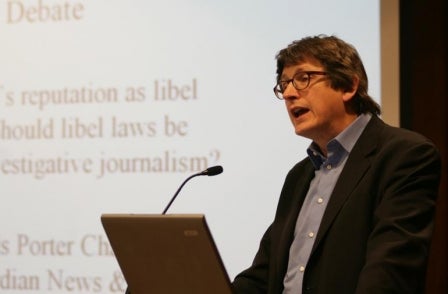
The Government has indicated it is taking libel reform seriously as journalists used Press Gazette's media law conference to highlight the threat to freedom of expression posed by huge legal costs.
Guardian editor Alan Rusbridger used a speech to the conference yesterday to reveal that Carter Ruck has issued the paper with a costs bill of £804,000 – running to 56 pages – arising from Tesco's libel action against the paper last year.
The Guardian wrongly stated that Tesco was avoiding £1bn of corporation tax and later published a front page apology stating that in fact the supermarket was alleged to have avoided £100m of stamp duty land tax.
Rusbridger said the huge legal bill had been lodged by Carter Ruck despite the fact that The Guardian had made an "offer of amends" – using a procedure intended to minimise costs by a publisher admitting it is wrong.
He said that the £804,000 figure "bears no relation at all to the damages claimed" and, pointing to the bill, he said: "To read this document you would weep for the cause of freedom of expression in this country".
In a debate on libel at the conference, David Hooper, of law firm from Reynolds Porter Chamberlain, cited new unpublished academic research which shows that English libel costs top a league table of 13 European countries – including Ireland, Italy, France and Germany. He said the study showed that English libel law costs are 140 times more than the average.
The enormous risk publishers face with libel was outlined earlier on in the conference by lawyer Julian Pike, from Farrer and Co, who revealed that the cost of getting it wrong and losing a major libel action at trial was now £2.4m. He emphasised that this would be for an unexceptional case.
Those costs are made up of the libel claimant's legal costs of £750,000, a 100 per cent success fee under CFA for the claimant's lawyers of another £750,000, the publisher's own costs of £500,000 and a further £420,000 to pay the insurance premium which the claimant would have taken to protect themselves against losing.
Mark Thomson from Carter Ruck defended CFAs by citing the case of dental technician Mohammed Amar who sued the BBC for £50,000 last month after wrongly being accused of being involved in car finance fraud. Thomson said that Amar would never have been able to bring his case without the controversial no win, no fee system.
Former mayor of Castlepoint in Essex, Jennifer Howlett, said she had used no win, no fee to end a campaign of libel and harassment brought against her by a millionaire property developer who had disagreed with one of her planning decisions. She said the CFA system had levelled the legal playing field for her.
In response to questions about the CFA system, justice secretary Jack Sraw said he was well aware of the problems and that a consultation paper on defamation, promised by under secretary of state for justice Bridget Prentice, will be published before the end of this month.
He said that he made been made aware of the problems caused by the CFA system after a case brought against his local paper in his Blackburn constituency, the Lancashire Evening Post.
"They raised a case with me where the damages awarded were relatively manageable – around £1,000, though it was quite difficult to see where the merit was in the case, but the costs ran into about £25,000 for the other side.
"I don't regard this as acceptable – I have established a review."
Email pged@pressgazette.co.uk to point out mistakes, provide story tips or send in a letter for publication on our "Letters Page" blog

